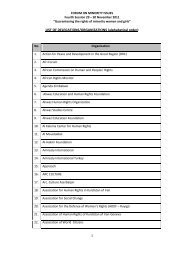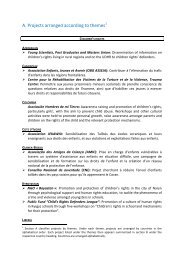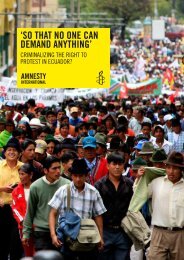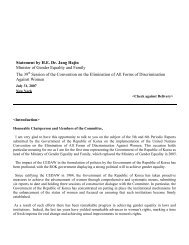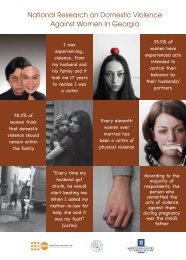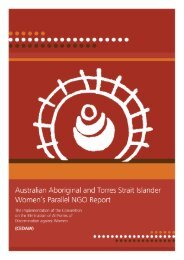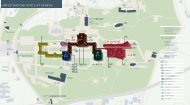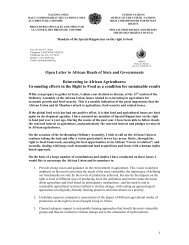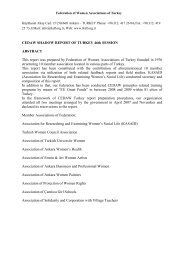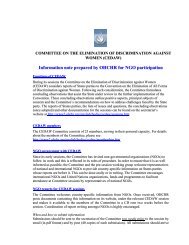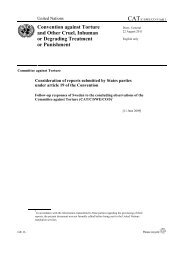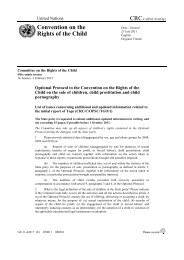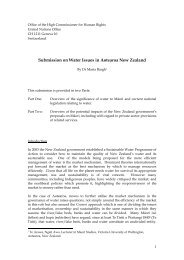Report - Office of the High Commissioner on Human Rights
Report - Office of the High Commissioner on Human Rights
Report - Office of the High Commissioner on Human Rights
- No tags were found...
Create successful ePaper yourself
Turn your PDF publications into a flip-book with our unique Google optimized e-Paper software.
Case study 2 – rural women migrating to urban areas (East New Britain)<br />
Indigenous women from regi<strong>on</strong>al areas move to Rabaul (urban area) to find employment, to sell<br />
vegetables, to get services not available in rural areas or to come to hospital. But <str<strong>on</strong>g>the</str<strong>on</strong>g>re is no shortterm<br />
accommodati<strong>on</strong>, and <strong>on</strong>ly poor and insecure l<strong>on</strong>g term shelter. They are vulnerable to rape and<br />
violence and forced to befriend o<str<strong>on</strong>g>the</str<strong>on</strong>g>rs to get shelter. Women have no choices – <str<strong>on</strong>g>the</str<strong>on</strong>g>re are no shelters,<br />
crisis centres and <strong>on</strong>ly limited access to welfare services. Women going to hospital have to seek shelter<br />
anywhere before <str<strong>on</strong>g>the</str<strong>on</strong>g>y can find transport to return to <str<strong>on</strong>g>the</str<strong>on</strong>g>ir communities.<br />
A woman and child left home to come and seek health services from a big hospital in town. This woman<br />
left her remote community because she was transferred from local authorities to <str<strong>on</strong>g>the</str<strong>on</strong>g> hospital because<br />
<str<strong>on</strong>g>the</str<strong>on</strong>g> disease could not be attended to in <str<strong>on</strong>g>the</str<strong>on</strong>g> rural health centres. She stayed in hospital and <str<strong>on</strong>g>the</str<strong>on</strong>g>n had<br />
to return home by boat. She had no m<strong>on</strong>ey to return so asked to live with her relatives, who were an<br />
hour away from hospital. She was raped by people <str<strong>on</strong>g>of</str<strong>on</strong>g> her own tribe.<br />
The people in town have integrated with many cultures i.e. attitudes towards each o<str<strong>on</strong>g>the</str<strong>on</strong>g>r have changed.<br />
They are living in a society that has been occupied by plantati<strong>on</strong>s, where plantati<strong>on</strong> workers were<br />
brought as slaves from all over PNG during <str<strong>on</strong>g>the</str<strong>on</strong>g> col<strong>on</strong>ial times. So <str<strong>on</strong>g>the</str<strong>on</strong>g>y d<strong>on</strong>’t have respect for indigenous<br />
people from remote areas, who have not integrated with o<str<strong>on</strong>g>the</str<strong>on</strong>g>r cultures.<br />
A woman living in a house that was 3 meters above <str<strong>on</strong>g>the</str<strong>on</strong>g> ground. She had to jump from a high post<br />
to a high building when she was four m<strong>on</strong>ths pregnant, and had to run away. She was raped in fr<strong>on</strong>t<br />
<str<strong>on</strong>g>of</str<strong>on</strong>g> <str<strong>on</strong>g>the</str<strong>on</strong>g> family she was staying with.<br />
Elements – Lack <str<strong>on</strong>g>of</str<strong>on</strong>g> housing, security and affordability (in both cases).<br />
In rural areas – lease <str<strong>on</strong>g>of</str<strong>on</strong>g> land 500kina/hectare, security <str<strong>on</strong>g>of</str<strong>on</strong>g> tenure, public goods and services, accessibility,<br />
envir<strong>on</strong>mental natural resources.<br />
Sources – PNG C<strong>on</strong>stituti<strong>on</strong> (i.e. IHD, equality and participati<strong>on</strong>); Welfare Act (protects <str<strong>on</strong>g>the</str<strong>on</strong>g> rights <str<strong>on</strong>g>of</str<strong>on</strong>g><br />
women and children); Beijing Platform for Acti<strong>on</strong> (1995).<br />
Guarantees – PNG C<strong>on</strong>stituti<strong>on</strong> (equality /participati<strong>on</strong> provisi<strong>on</strong>s).<br />
Overriding principles – N<strong>on</strong>-discriminati<strong>on</strong> – women have a lower status and lower value, especially<br />
women who are poor and illiterate.<br />
Causes/Obstacles –<br />
– The government’s priorities are in development and ec<strong>on</strong>omic gain, but not in provisi<strong>on</strong> <str<strong>on</strong>g>of</str<strong>on</strong>g> basic<br />
services for rural communities;<br />
– Lack <str<strong>on</strong>g>of</str<strong>on</strong>g> housing policies to accommodate rural populati<strong>on</strong>s moving into town to access health<br />
services;<br />
– Lack <str<strong>on</strong>g>of</str<strong>on</strong>g> informati<strong>on</strong> <strong>on</strong> land tenure within urban areas;<br />
– Lack <str<strong>on</strong>g>of</str<strong>on</strong>g> security in land systems in o<str<strong>on</strong>g>the</str<strong>on</strong>g>r parts <str<strong>on</strong>g>of</str<strong>on</strong>g> <str<strong>on</strong>g>the</str<strong>on</strong>g> province means that more land is in threat<br />
<str<strong>on</strong>g>of</str<strong>on</strong>g> being extended for oil palms;<br />
– Lack <str<strong>on</strong>g>of</str<strong>on</strong>g> informati<strong>on</strong> <strong>on</strong> land tenure systems in rural areas;<br />
– Lack <str<strong>on</strong>g>of</str<strong>on</strong>g> informati<strong>on</strong> in rural areas <strong>on</strong> opti<strong>on</strong>s for rental accommodati<strong>on</strong> in urban centres.<br />
206 WOMEN’S RIGHTS TO ADEQUATE HOUSEING AND LAND



